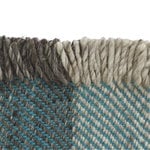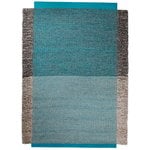Kvadrat’s Fringe wool rug was named after its most prominent feature, the long fringes that run along its sides. Designed by Daniel Costa, the rug is woven by hand by skilled Indian weavers from blue, smoky grey and charcoal grey wool yarns that blend into beautiful blocks of colour. The vibrant blue ends add to the fun, contemporary look. According to Costa, Fringe makes a happy addition to any home due to its fringes and fresh colours.


Fringe rug, 0722
Kvadrat
Description
Kvadrat’s Fringe wool rug was named after its most prominent feature, the long fringes that run along its sides. Designed by Daniel Costa, the rug is woven by hand by skilled Indian weavers from blue, smoky grey and charcoal grey wool yarns that blend into beautiful blocks of colour. The vibrant blue ends add to the fun, contemporary look. According to Costa, Fringe makes a happy addition to any home due to its fringes and fresh colours.
Product details (8)
- Material
- 100% new wool
- Colour
- Blue, light grey, dark grey
- Length
- 200 cm
- Width
- 140 cm
- Height
- 0.5 cm
- Measurement details
-
Length, width, height: +/-3%.
Length of fringes 15 cm, colour block at ends 5 cm and 10 cm. - Notes
- As the rugs are woven by hand, slight colour differences and irregularities may occur.
- Care instructions
- Professional cleaning.
- Product ID
Designer
Daniel Costa is a designer from Design Academy Eindhoven. His style is often characterized by an organic touch and finding surprising elements from ordinary and traditional materials. Costa’s unique style can be found for instance from the Fringe rugs by Kvadrat.
View all productsReviews (0)
Sustainability
The Product Sustainability Framework, our criteria of sustainable design, helps you find the most sustainable products in our selection. Read below which sustainability criteria this product has met.
Working conditions & labour 9/9
-
Equal opportunities for all employees
-
Commitment to UN Global Compact, fair compensation for all employees
-
Corporate responsibility requirements defined and communicated for suppliers
-
Systematic work for improved inclusion and well-being in the workplace
-
Transparent supply chain
-
Suppliers' compliance to a code of conduct ensured
-
Direct suppliers audited and certified
-
Compliance to the UN Guiding Principles on Business and Human Rights ensured in the supply chain
-
Support for community involvement in the supply chain
Eco-friendly production 9/9
-
Fair and resource-wise water-use in production
-
No incineration or landfilling of returned items
-
No use of endangered species as materials
-
No direct environmental emissions or waste (excl. GHGs) from production
-
The sustainability of direct suppliers' production is addressed and monitored
-
Production and material sourcing that respect biodiversity, animal rights, and natural ecosystems
-
Material-efficient and ecological packaging
-
Positive impact on nature’s well-being through operations that regenerate natural ecosystems
-
No potentially harmful chemicals used in own production
Climate impact 7/8
-
Company's direct greenhouse gas emissions identified and commitment to reduction
-
Product's carbon impact identified and commitment to reduction
-
Guidance on energy- and eco-efficient use of the product
-
Contribution to climate initiatives beyond the brand’s direct operations
-
Low-carbon or compensated transportation
-
100 % renewable energy in own production and operations
-
Carbon neutral or carbon negative product
-
Carbon footprint of the product calculated and goals set to reduce it
Sustainable materials 6/6
-
Sustainable and long-lasting material choices
-
No harmful or hazardous substances
-
Responsible raw material sourcing and production
-
Materials suited for circularity: monomaterials, recyclable finishings, renewable or recycled contents etc.
-
Ecological materials: natural, biodegradable, recyclable or recycled contents
-
Outstanding materials in terms of innovativeness, responsibility, sustainability and circularity: local production or sourcing, 100 % recycled content, C2C-certification etc.
Circular design 5/5
-
High aesthetic quality promoting long-term use of the product
-
Technically durable product design and material choices
-
Design for enduring life-long quality
-
Design and support for product maintenance, repair and upgradability
-
Innovative circular design solutions: circular service system, resale platform, remanufacturing, collection of used products, etc.





